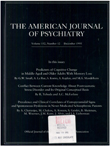The enduring psychosocial consequences of mania and depression
Abstract
OBJECTIVE: The authors sought to determine the scope, severity, and persistence of psychosocial impairment arising from bipolar and unipolar affective disorder. METHOD: Patients with bipolar (N = 148) or unipolar (N = 240) major affective disorder were assessed as they sought treatment and again after a 5-year follow-up. Concurrently, parents, siblings, and adult children underwent similar assessments and were followed for 6 years. To quantify the impact of affective disorder, probands were individually matched to relatives who had no lifetime history of affective disorder. Sixty-nine relatives who were depressed at intake constituted a separate, nonclinical study group and were also matched to relatives who were well. RESULTS: Both unipolar and bipolar patients began follow-up with deficits in annual income. Relative to comparison subjects, affective disorder groups were significantly more likely to report declines in job status and income at the end of follow-up and significantly less likely to report improvements. Similarly, both bipolar and unipolar patients showed significant deficits in nearly all other areas of psychosocial functioning measured at follow-up. Except for relationships with spouses, deficits did not differ significantly by polarity. Surprisingly, probands with recovery sustained throughout the final 2 years of follow-up also showed severe and widespread impairment. Relatives with major depression exhibited substantial deficits on follow-up, but job status and income were not significantly affected. CONCLUSIONS: The psychosocial impairment associated with mania and major depression extends to essentially all areas of functioning and persists for years, even among individuals who experience sustained resolution of clinical symptoms.
Access content
To read the fulltext, please use one of the options below to sign in or purchase access.- Personal login
- Institutional Login
- Sign in via OpenAthens
- Register for access
-
Please login/register if you wish to pair your device and check access availability.
Not a subscriber?
PsychiatryOnline subscription options offer access to the DSM-5 library, books, journals, CME, and patient resources. This all-in-one virtual library provides psychiatrists and mental health professionals with key resources for diagnosis, treatment, research, and professional development.
Need more help? PsychiatryOnline Customer Service may be reached by emailing [email protected] or by calling 800-368-5777 (in the U.S.) or 703-907-7322 (outside the U.S.).



